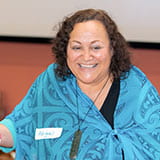SEED projects 2018 – He vaka moana: Navigating Māori and Pasifika student success
Leadership through inclusive learning and teaching innovations
 Abigail McClutchie, Ngti Porou, Te Rarawa (Te Tumu Herenga: Libraries and Learning Services)
Abigail McClutchie, Ngti Porou, Te Rarawa (Te Tumu Herenga: Libraries and Learning Services)
Our project was based on a case study of the Leadership Through Learning programme. The SEED grant supported the project as part of the University of Auckland’s 2018 CLeaR He Vaka Moana research. The theme ‘pikipiki hama kae vaevae manava’ is a metaphor that expresses how traditional vaka would be bound together during long-distance journeys. On these stops, ideas, knowledge, and resources were shared, before the waka would be disconnected and continue independently again. This metaphor also expresses the way Leadership Through Learning student-leaders support each other in class one hour per week during the semester, and the Māori and Pacific methodological approaches used in this research. For example, CLeaR Fellows would reciprocate ideas, discuss our research and help each other see our projects through to completion. Furthermore, it is a metaphor that expresses what students and the Fellows found pleasurable in working collaboratively, and yet navigating independently. With lashing our waka together we re-claimed, re-viewed and re-storied our journeys and aspirations for better outcomes for Māori and Pacific staff and students.
Leadership Through Learning was designed for Māori and Pacific tertiary students to lead, empower and transform, through normalising their leadership and learning success. The He Vaka Moana research found normalising success helps counter negative stereotypes, micro-aggressions, and everyday colonialism and racism that the students quite often encounter. Instead normalisation of success creates positive stereotypes and challenges deficit-framing faced by Māori and Pacific students.
The methodological approaches of kaupapa Māori and Pacific Research, especially talanoa method, highlighted the student-leaders’ voice, their aspirations, and personal growth as leaders. Student-leaders’ engagement in the programme and their relationships strengthened their identity and self-efficacy, and provided opportunities to create positive stereotypes, in the programme’s three critical areas: leadership, empowerment and transformation.